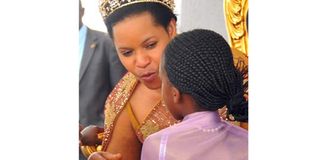African queens denounce female genital mutilation

Tooro queen mother Best Kemigisa talks to a girl recently. Photo by JOSEPH KIGGUNDU
What you need to know:
Most affected. Young girls are said to be more vulnerable to the practice believed to give women dignity.
Kween
African queens and female cultural leaders have added their voice to the campaign against Female Genital Mutilation (FGM).
Under their association of African Queens and Women Cultural Leaders Network Uganda Chapter (AQWCLN), they called upon the East Africa governments to execute their commitment to end FGM which they said is a discriminatory and harmful practice to girls.
“I did not know the procedure was this horrible but after watching the video on FGM, I have discovered they cut much of the female organ leaving it open. Surely, this is a violation of women’s rights,” said Tooro queen mother Best Kemigisa who is also the President of AQWCLN.
She added: “It is a dangerous and irreversible procedure that negatively impacts on the general health, child-bearing capabilities and educational opportunities of girls. This practice must end,” Ms Kemigisa said.
She was addressing delegates from Kenya and Uganda and traditionalists at the 18th Sebei Culture Day celebrations on Monday, at Chemwania Primary School in Kween District.
Ms Kemigisa said ending FGM is crucial to the achievement of two of the Millennium Development Goals: improving maternal health and promoting gender equality.
AQWACLN would camp in Sebei sub-region for five days to de-campaign the practice, sensitise the local people on the law and promote the dignity of the girl-child in this part of the country.
Ms Kemigisa revealed they would appeal to several lobbyists to ensure adoption of the UN General Assembly resolution banning FGM worldwide.
The resolution was passed at the 65th session of the Assembly in New York in September 2009.
Kween District chairperson Paul Machinjach said his council was devising plans to end FGM through community sensitisation and policing in the remote areas especially the hills.
AQWALN becomes the latest organisation to join a host of other prominent personalities, including first lady Janet Museveni, the Burkinabe and Italian first ladies, Ms Clio Napolitano and Ms Emma Bonino, respectively, who signed a UN appeal calling for a total ban on FGM.
Reports indicate that the FGM practice is most prevalent in the villages of Kapses, Sosho, parts of Suam in Bukwo, Kapkorosoy, Kapkuripson and Kabei in Kapchorwa and Kwanyiny and Benet sub-counties in Kween District and preparations for this year’s ritual are in high gear.
Report on the status of fgm
A report presented by Reproductive Educative and Community Health (REACH) at Chemwania Primary School in Kween District during the 18th annual Sabiny Day on Monday, indicated that 120 girls underwent the ritual in 2012. However, local leaders say the number is higher because many cases went unreported.
The report 2012 entitled; Campaign against FGM to restore dignity of girl child, was presented by REACH Director Beatrice Chelangat. Ms Chelangat said the passing of the law against FGM in 2010 has made many people denounce the ritual.
Ms Chelangat said FGM still takes place amongst the most remote and illiterate communities but testified that the number of girls undergoing the FGM had significantly dropped from 971 girls in 1996 to 120 in 2012.
REACH is a community based organsiation established in Kapchorwa to improve reproductive health conditions and fight FGM among the Sabiny. “I know that the statistics from REACH indicate that 120 girls were circumcised but as a district, we know that more than 200 girls underwent FGM in 2012 despite the law,” said Kween Resident District Commissioner Joseph Okwakau.




